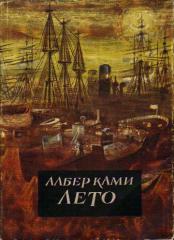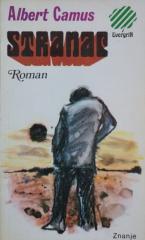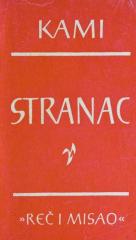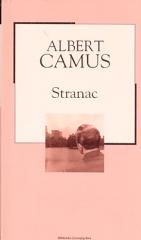Albert Camus
Albert Camus (1913.–1960.) bio je francusko-alžirski pisac, filozof, novinar i esejist, jedan od najznačajnijih predstavnika filozofije apsurda. Rođen je u Mondoviju (današnji Dréan) u Alžiru, tada francuskoj koloniji. Odrastao je u siromašnoj obitelji, a obrazovao se u Alžiru, gdje se rano uključio u novinarstvo i kazalište.
Camus je poznat po djelima koja istražuju apsurdnost ljudske egzistencije i potragu za smislom u svijetu bez božanskog reda. Njegov najpoznatiji roman, Stranac (1942.), prikazuje ravnodušnog protagonistu koji odbija društvene norme i tragično završava, dok esej Mit o Sizifu (1942.) filozofski razrađuje pojam apsurda. Ostala ključna djela uključuju romane Kuga i Pad, te drame poput Kaligula.
Iako ga se često povezuje s egzistencijalizmom, Camus je odbacivao tu etiketu. Bio je i politički angažiran, osobito tijekom francuskog otpora u Drugom svjetskom ratu i kasnije u debatama o francuskoj kolonijalnoj politici. Godine 1957. dobio je Nobelovu nagradu za književnost, postavši jedan od najmlađih dobitnika.
Tragično je poginuo u automobilskoj nesreći 1960. godine. Camus ostaje simbol intelektualnog otpora, moralne jasnoće i filozofske dubine.
Naslovi u ponudi
Leto
Zbirka književnih i filozofskih eseja Alberta Camusa.
Stranac
Roman Stranac (1942.) djelo je francuskog pisca Alberta Camusa i ključni tekst egzistencijalizma i apsurda. Roman je napisan u sažetom, gotovo monotonom stilu, što pojačava osjećaj otuđenosti.
Stranac
Stranac je roman francuskoga književnika i filozofa Alberta Camusa. Izdan 1942. godine, jedan je od najznačajnijih romana francuske književnosti dvadesetog stoljeća i jedan od najboljih literarnih prikaza apsurda ljudske egzistencije.
Stranac
"Stranac" (1942.) Alberta Camusa, klasično djelo egzistencijalizma, prati život Meursaulta, emocionalno indiferentnog Alžirca francuskog podrijetla, čiji apatičan odnos prema svijetu vodi do tragičnih posljedica.
Stranac
Stranac
Stranac je roman kojim je Camus postigao prvi veliki uspjeh na koji je utjecaj izvršila Nietzscheova filozofija, Sartreova filozofija egzistencijalizma te, najviše, njegova filozofija apsurda.





